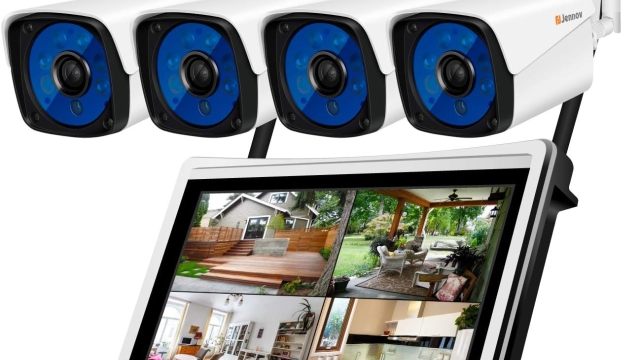
When it comes to safeguarding our homes, businesses, and public spaces, security cameras have become an integral part of our modern lives. These unassuming devices, tucked away in inconspicuous corners, play a crucial role in surveillance and crime prevention. In this article, we delve into the intricate world of security cameras, shedding light on their purpose, functionality, and the ways in which they contribute to our safety and security.
From the moment we step out of our homes to the time we enter public spaces, security cameras are ever-present, quietly observing the surroundings like vigilant sentinels. Their unblinking lenses capture and record the moments that occur, acting as the unseen watchers that maintain a watchful eye over our well-being. These silent guardians not only provide a sense of security but also serve as a deterrent for potential wrongdoers, signaling that their actions will not go unnoticed.
Join us on this explorative journey as we uncover the untold stories behind security cameras. We will discuss the advanced technology that powers them, the various types of cameras employed in different settings, and how they operate seamlessly to protect what matters most to us. Get ready to uncover the hidden realm of security cameras and gain a deeper understanding of their vital role in safeguarding our lives and belongings.
The Evolution of Security Cameras
Security cameras have undergone a remarkable transformation over the years, adapting to the changing needs of the modern world. Initially, these devices were bulky and had limited functionalities. However, advancements in technology have revolutionized the field, resulting in sleek, powerful cameras that offer enhanced surveillance capabilities.
In the early days, security cameras were primarily used for basic monitoring purposes. They provided a rudimentary means of capturing images or videos for later review. These cameras were often installed in conspicuous locations, aiming to deter potential intruders. However, their effectiveness was limited, as the quality of the footage was poor, making it challenging to identify individuals or discern important details.
As technology progressed, security cameras became smaller and more inconspicuous. The introduction of digital cameras brought significant improvements, enabling higher resolution images and smoother video recordings. With the advent of the internet, cameras became network-enabled, allowing for remote monitoring and access to live feeds from anywhere in the world. This marked a significant breakthrough in the field of surveillance.
Furthermore, the integration of artificial intelligence (AI) into security cameras has brought forth numerous advancements. AI-powered cameras are now capable of performing complex tasks such as facial recognition, object detection, and behavioral analysis. These intelligent features enhance the overall security system, providing real-time alerts and allowing for proactive responses to potential threats.
In conclusion, the evolution of security cameras has been a remarkable journey. From their humble beginnings as bulky devices with limited capabilities, they have transformed into sleek, digitally advanced tools that offer enhanced surveillance capabilities. With ongoing advancements in technology, security cameras continue to play a vital role in maintaining the safety and security of various environments.
Benefits and Limitations of Security Cameras
Security cameras provide numerous benefits for both individuals and organizations. By monitoring and recording activities in various settings, they contribute to enhanced safety and reduced risks. However, it is important to acknowledge their limitations and consider potential drawbacks.
Firstly, security cameras act as a deterrent against criminal activities. The mere presence of these devices can significantly discourage potential intruders or wrongdoers. Knowing that their actions are being recorded increases the chances of getting caught, thus discouraging criminal behavior and helping maintain a secure environment.
Secondly, security cameras aid in investigations and evidence collection. When incidents occur, the recorded footage can be invaluable for identifying suspects, understanding the sequence of events, and providing evidence for legal proceedings. This can assist law enforcement agencies, businesses, and individuals in resolving disputes, uncovering the truth, and ensuring justice is served.
Despite their benefits, security cameras have limitations that need to be acknowledged. One major concern is the invasion of privacy. While they are primarily intended to ensure security, their constant monitoring can be perceived as an infringement on personal privacy rights. Striking a balance between security and privacy is crucial to address these concerns and ensure that surveillance is conducted responsibly.
Security Camera Sales
Additionally, the effectiveness of security cameras is dependent on proper installation, maintenance, and timely monitoring. Without regular checks, cameras may malfunction or fail to capture critical incidents. Therefore, it is important to have trained personnel responsible for maintaining the cameras, regularly reviewing footage, and addressing any technical issues promptly.
In conclusion, security cameras provide significant benefits by deterring crime and aiding in investigations. However, it is essential to recognize and address their limitations, particularly relating to privacy concerns and the need for proper maintenance. By understanding and managing these aspects, security cameras can continue to play a valuable role in enhancing safety and security in various settings.
3. Privacy Concerns and Ethical Considerations
In today’s world, the prevalence of security cameras raises important questions about privacy and ethics. With our lives becoming increasingly digitized and interconnected, it’s crucial to examine the implications of these watchful eyes.
One key concern revolves around the invasion of personal privacy. As security cameras become more sophisticated and omnipresent, individuals may feel uneasy about their every move being monitored. The fear of being constantly observed can undermine our sense of autonomy and freedom, leading to a chilling effect on our behavior.
Moreover, the storage and use of recorded footage present ethical considerations. Who has access to this footage? How is it being stored and protected? These questions are vital in ensuring that the data collected by security cameras is not misused or exploited. Safeguarding the privacy of individuals should be a priority, particularly as our reliance on surveillance technology grows.
Lastly, there is the issue of potential abuse of power. While security cameras serve a legitimate purpose in enhancing safety and deterring criminal activity, there is always a risk of misuse by those in positions of authority. It is essential to establish clear guidelines and regulations to prevent any potential violations of individual rights or unjust surveillance practices.
As we navigate the intricacies of security cameras, we must tread carefully to strike a balance between safety and privacy. By addressing privacy concerns and ethical considerations, we can ensure that these unseen watchers benefit society without encroaching upon the fundamental rights and values of individuals.



